Trying to find some games to while away time with your significant other or close friend? Don't have time after a busy day at work to organize a group get-together? Want to introduce a new board gamer to something accessible without the pressure of seasoned professionals? Well, look no further!
While this is not a "best of" list, it showcases a wide range of games from casual to heavy that we have played and enjoyed. We hope you will find something worth checking out below; or, if you're an old pro, check off the ones you have heard of and played.
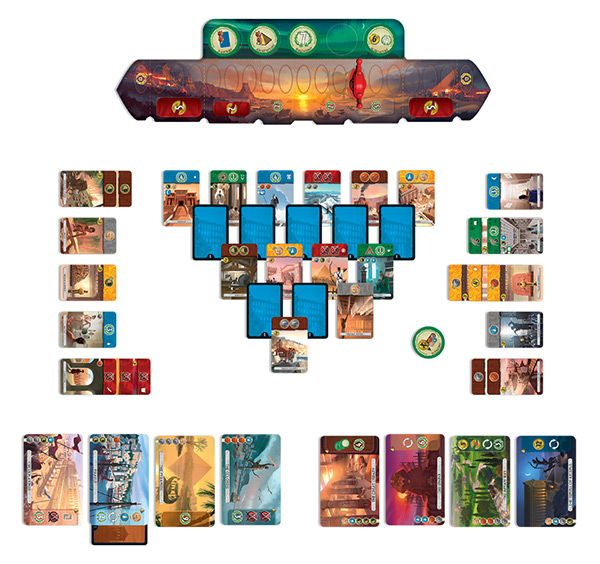
7 Wonders Duel is the intuitive successor to 7 Wonders, the hit board game that can actually play 7 players quite well! Unfortunately, it wasn’t playable two-player, which likely prompted Duel. Here, players experience three rounds in which they take turns dismantling pyramids of cards alternating from face-up to face-down. Each card serves a different purpose, be it resource, money, victory points, military, or so on. With a good mix of luck and strategy, 7 Wonders Duel is a quick, addictive board game that constantly has each player recalculating what the next best move is.
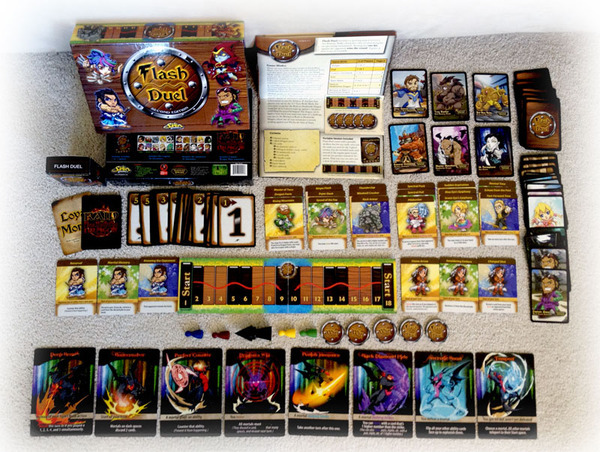
Sirlin Games has put out several hits to date that seem to revolve around fighting, as its creator, David Sirlin, has a noteworthy background in fighting game competitions and development. Each title he puts out uses the same family of characters he crafted years ago, which adds a flair and personality to each finished project. Yomi and Flash Duel are two exceptional two-player games that both require an intense level of strategy, calculation, and, of course, “yomi.” “Yomi” is the idea of vaguely understanding and predicting what one’s opponent will do, therefore making the best possible choice to take advantage of this “knowledge.” What on the surface seems like haphazard guessing quickly becomes a game of strategy and depth once one learns an opponent or how a specific character is frequently used. Yomi, then, is a rock-paper-scissor style brawl game in which players need to be knocked down to zero hit points. Each player chooses a card out of his or her hand to play face down. Once each player has selected, they flip and see the outcome. Attacks beat throws, throws beat blocks, and blocks stop attacks. The rules are a bit more complex than that and several cards have abilities that break the rules. Flash Duel is a quicker, “simpler” version of the formula inspired by an old board game called En Garde, but with more meat. Each player draws from the same pool of 25 cards that holds five of each number between 1 and 5. With these cards, they can run up and down a narrow field or attack. One hit, and the round is over until there’s a winner out of five games. Both of these games have years worth of replayability, but the biggest downside to Sirlin’s games are “patches.” His games aren’t necessarily released finished, and he sometimes fixes imbalances, which is great, but that means that your first print edition of any game he puts out may be outdated within a couple years. If you’re fine with that, then please enjoy his games!
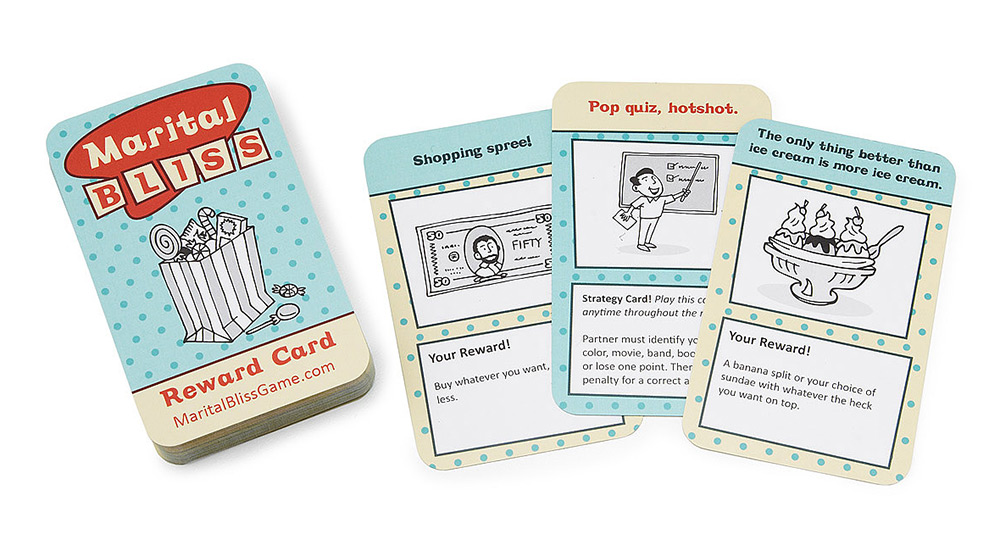
I’ve yet to find another game quite like Marital Bliss. Marital Bliss is to board gaming what Pokemon Go is to augmented reality video games. While most games consist of an hour or two at a table with the experience over directly after that, Marital Bliss makes the fun last all week. This is a game for competitive couples wherein both partners choose a reward in secret (included on cards in the game). After choosing a reward, they are randomly dealt missions that they have to complete over the course of the week, which offer various points based on the difficulty of the mission. The quests can include anything from dusting the house to giving a compliment to humming their favorite song. If the partner thinks that you’re doing something special just because you got a card with the quest on it, they can call you on it and if it’s true, the points on the card are forfeit; if they guess wrong, then a similar penalty is allotted. The idea is that Marital Bliss can improve one’s relationship because there’s extra incentive to lay red herrings. For couples looking for a bit of fun and motivation to do chores, Marital Bliss will provide fun quicker than you can say “marriage counseling!"
Pixel Tactics is one of few video or board games out there that appeals to nostalgia and offers a unique, fun experience. Each player selects a leader to protect in this duel of miniature cards laid out on a 3x3 grid. After choosing a leader, they have various actions they can take on their turns, such as draw cards, play units, or attack. Play alternates with each row of the 3x3 grid consisting of one turn of play each. Once the back row has been completed, the players return to the front row. The chief draw here is how each unit's placement matters significantly. A bruiser at the front lines may be an exceptional melee, though in the middle row they block projectiles to protect the backline, while in the backline they may heal over time so that they can be later repositioned back to the front. Each unit has this unique sort of game design. I’ve found only two downsides with this game: the rules aren’t always intuitive and can slow down play, and players may have to read many units until they’re practically memorized—for their side and their opponents’—which further bogs down gameplay. If you’re looking for a deep, tactical, nostalgic trip in a head-on-head combat style, Pixel Tactics is an excellent choice.
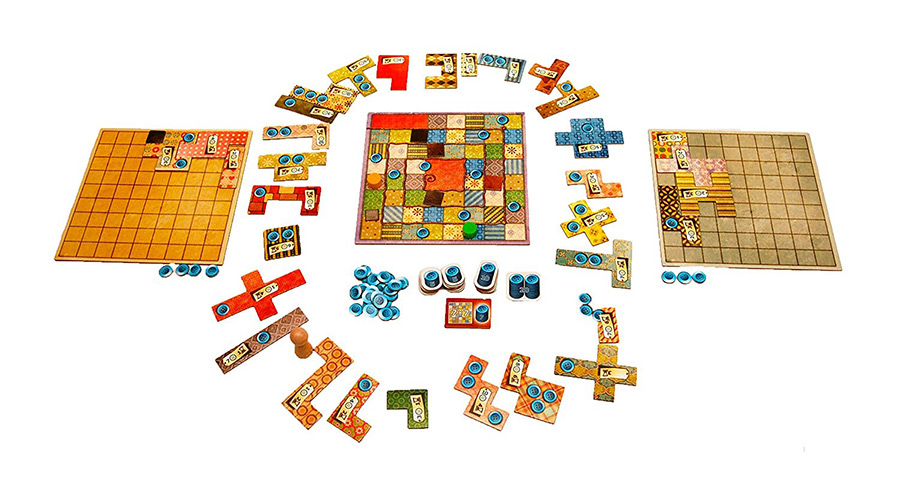
Patchwork looks deceptively casual with its sewing theme, but make no mistake, there is much room here for spatial and calculative maneuvering. The game consists of multiple tetris-like patches set in a circle around the spiral score board. Instead of taking turns, the player furthest behind in the spiral takes their turn, and it's possible to take multiple actions in a row before your opponent. On each turn, you may either pay for and place an available patch on your 9x9 board, or move your marker on the spiral board one space ahead of your opponent and collect buttons (currency/points) equal to the number of spaces you move. Whenever you place a patch, you must also move your marker forward the number of spaces equal to the time space indicated on the patch. Once both players' markers have reached the center of the spiral, the game ends and you score the number of buttons you have and subtract two points for each empty space on your board. Thus, it's not a particular race to the center of the spiral, but rather to take as many actions as possible to collect buttons and fill up your board. While it may seem that this game isn't for the spatially-challenged, players can always pick up patches and try them out on their board before committing to a move. Whether as novice or master, Patchwork definitely offers an engaging tango of stitchery.
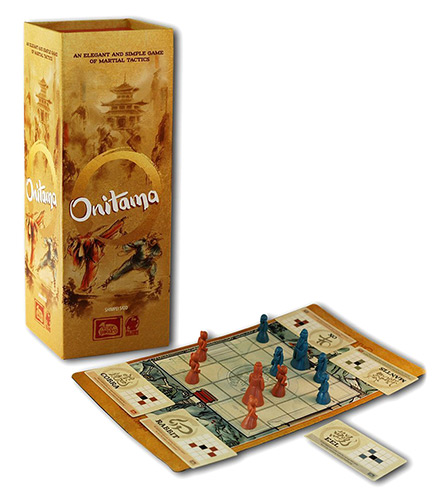
Onitama is a perfect combination of abstract gaming and quick filler that can be played under 20 minutes. In each game, 5 movement cards are drawn from a deck of 15, which determines the type of movements available for the game. Each player receives 2 of the 5 selected cards. On each turn, the player will select 1 of their 2 cards and move any of their own pawns on the board according to the movement indicated on the card. The player then takes the 5th available card on the side of the board and replaces it with the card they just used. Now, it's the next player's turn. Both players have one onmyo pawn and four puppets on the board, and victory is yours once you take your opponent's onmyo pawn or place your onmyo pawn on the opponent's onmyo pawn's starting space. Certain movement cards affect the puppets and onmyo differently, compounding the potential mental gymnastics needed to assess future moves. If you are worried about variety and replayability, Arcane Wonders just published an expansion, Onitama: Sensei's Path, at Origins 2017 that includes sixteen new movement cards that can be incorporated into the game. For those who enjoy abstract, strategic games, such as chess, that are easy to learn and hard to master, Onitama is sure to delight.
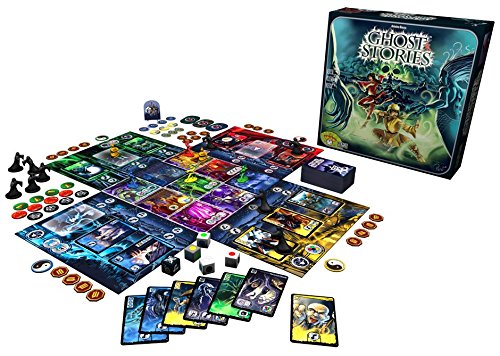
Ghost Stories is one of those games I table frequently but don't know anyone else who owns it. A fiendishly difficult cooperative game, it's certainly not for the faint-hearted. Players are taoists with individual special powers attempting to exorcise a demon, Wu Feng, from a village. You set up a deck of ghosts that you must fend back or defeat until you encounter Wu Feng and vanquish him. Each turn, the active player can either attack a ghost or activate a village tile's ability. With one or more ghosts spawning every turn, you can easily see how quickly this escalates. Like many cooperative games, there are infinite ways to lose and only one way to win. As the difficulty level increases, taoists start with fewer resources and can end up facing multiple iterations of Wu Feng. One key reason why I recommend Ghost Stories above other well known cooperative games is due to its malleability in setup for different numbers of players, so the game plays excellently from 1-4 players (or 5, with an expansion). Two players can play as two taoists with two dummy boards; or, they can each control two taoists with no dummy boards; or, one player can control two taoists and the other just one with one dummy board; the possibilities are endless. Furthermore, the Ghost Stories: Black Secrets expansion allows one player to become Wu Feng and control the baddies, and the opponent can then control all four taoists on the good side if they so choose! With two excellent expansions, four levels of difficulty (the highest of which, even after 8 years of playing, I have only succeeded in defeating Wu Feng once), and numerous ways to set up the village tiles and ghosts, Ghost Stories is like Dark Souls: it hurts so much but you always come back for more.
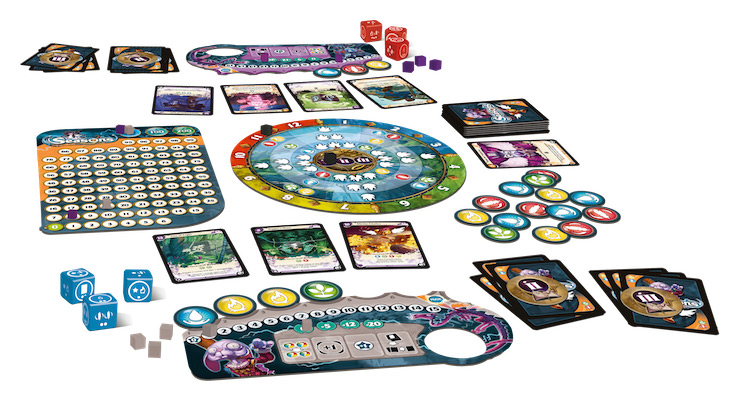
If you've played Magic: The Gathering, Seasons will seem familiar, but without all the expense and never ending upgrades. At the beginning, players can either draft, deal at random, or play with premade decks of 9 cards. Next, they must separate their 9 cards into 3 sets of 3 cards; one for each year the game will progress through. In year one, players will have access to their year one cards, and in year two, they will add their year two cards to their hand, and so on. The first player rolls the corresponding season dice (winter/spring/summer/autumn) equal to the number of players plus one, then in turn order, players select one die that provides the best possible resources for that round. Dice can give you one or a combination of the following: energy tokens, which are used to summon cards; a summoning gauge, which gives you room to summon cards; crystals, which are points and can also be used to summon cards; and last, the ability to transmute energy tokens into crystals. The pips on the final unpicked die of the round indicate how quickly the time marker progresses through the seasons. With only two copies of each card in a full deck of 100, players must optimize their resource management and magnify potential card combinations to score the most points at the end of the game. For more variety, there are two solid expansions that add additional mechanics and cards to the deck. Playing just as smoothly with 2, 3, or 4 players, Seasons is definitely a keeper for those who love card drafting and hand management.
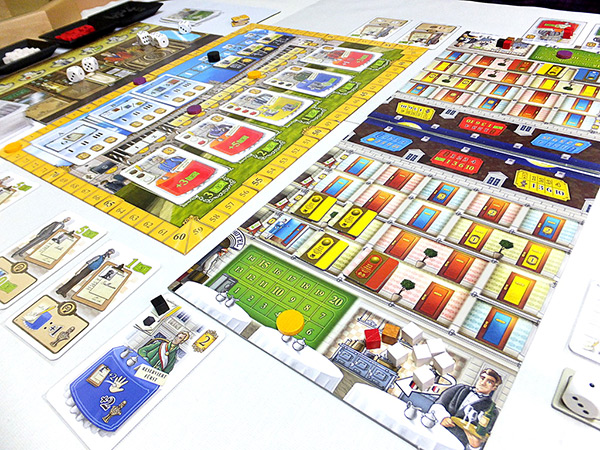
One of my favorite (but often poorly executed) game mechanics is dice rolling. Oftentimes, games do not provide enough for players to work around the fickle mistress of luck—just look at Yahtzee. All kidding aside, Grand Austria Hotel pushes the envelope in the dice rolling world of board games. Players are hoteliers trying to entice guests to stay in their rooms by bribing them with cake, strudel, coffee, and wine. In the meantime, you may want to hire staff members who help your hotel become more efficient, either with gaining resources, coaxing guests, or scoring points. Besides trying to ready enough rooms for guest occupancy and shoving travelers in, you must also balance the emperor's favor for your establishment; he rewards the hotels he likes and punishes the ones he does not. Two mechanics really stand out here: dice picking and turn order. Before each round, the first player gathers all the dice and rolls them; they are then sorted by number into their corresponding action. If there are 3 number 1 dice, you can take the number 1 action but 3 times better, and by taking the action, you take a number 1 die, which subsequently makes that action weaker for other players. When determining turn order at the start, players flip down the corresponding turn order markers according to how many players are playing and select one at random. In future rounds, players simply pass their turn order markers to the player on the left. In a two player game, players pick dice as such: the first player picks a die first and fourth, and the second player picks a die second and third, effectively getting two turns in a row. Thus, the benefit to going first is often equalized. If there are no moves you wish to take on your turn, you may pass, effectively giving up your turn until everyone else has completed theirs, and then you remove a die from the available pool and re-roll the rest. Though Grand Austria Hotel may seem a little overwhelming at first with all the iconography and various aspects to manage, once you get your hotelier wits about you, you'll be back for more!
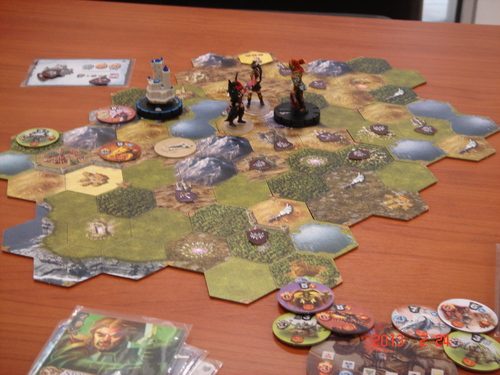
Mage Knight is one of my top three favorite board games of all time. Developed by the prodigious Vlaada Chvatil, Mage Knight is a deeply engrossing game in which players have to conquer cities to stave off impending evil. I know, the plot doesn’t have much to offer, but this is a heavily strategic board game absolutely dripping with careful planning beyond almost any other title. Each turn can feel like a demanding puzzle in which players have to use their customized deck of cards to topple treacherous foes, traverse hazardous landscapes, and convince various allies to join the quest to stop evil. Like other deck builders like Dominion, players draw a hand of five cards from their character’s unique deck and have to do the best thing they can with those cards to maximize efficiency, because time isn’t on their side. As players gain levels, more cards are added to the deck, and opportunities arise in which players can purchase more cards. By the end of the game, the deck is so vastly different (and more powerful) than the starting cards you had that you really feel like you’ve accomplished a lot over the course of the journey. Mage Knight can be played solo, cooperatively, or competitively with unique scenarios to keep the game interesting. The map is player-constructed as one travels. Finally, the two downsides to Mage Knight: This is one of the most rule-heavy games I’ve ever played, but the investment is totally worth it. Last, the game can take several hours, which is part of the reason why we recommend this as a two-player game. The first game will take several hours, but once everyone knows what they’re doing, it can easily be played within two or three hours.